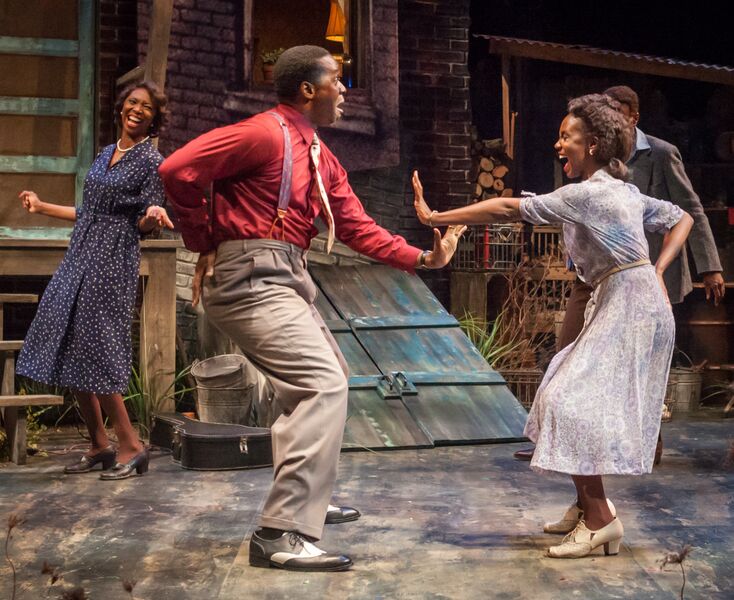by Sarah Rohleder —
A friend and I sat among 70 or so senior citizens in the Pamela Brown auditorium at Actors Theatre for a production of “Seven Guitars,” directed by the renowned Coleman Domingo. “Seven Guitars” is one of August Wilson’s Pittsburgh Cycle of plays, each depicting African-American experience in a decade of the 20th Century.
This Wilson play depicted the late 1940s, focusing in part on the conflict between black men and racist police officers: a controversial and oft-discussed topic still today. But the central character of the play, musician Floyd “Schoolboy” Floyd—played by J. Alphonse Nicholson—ultimately falls victim to the aftermath of his own crime rather than the crime for which he was unjustly incarcerated. The play opens with Floyd’s friends mourning his death and leads into the story of how they got there.
The surrounding, but equally potent, characters each present their own connection to Floyd and to the larger narrative of a northern city during a rapidly changing time in African-American history. Within this narrative lies the obvious generational divide between old neighborhood mystic Hedley, played by Harold Surratt, head-of-the-house Louise, played by Sharon Washington, and Floyd’s young lover Vera Dotson, played by Joniece Abbott-Pratt.
Floyd, the lively and hopeful musician, wishes to bring Vera to Chicago with him, where he intends to record his next hit. His first hit became so successful that it played even on the primarily white stations, but he made very little money off it after the producers took their cuts. He is determined to get ahead this time, with Vera by his side. Louise advises against Vera going to Chicago with Floyd, but his charm begins to change Vera’s mind.
Louise, other neighborhood fellows—Canewell, played by Forrest McClendon and Red Carter, played by Bowman Wright—don’t have the same hopeful perspective on which Floyd thrives. Headly does, however, have hope in the rise of the Black Man, just not due to the advances African-Americans were making on their own.
Hedley, the aforementioned mystic of the group, finds hope in the conjured-up memories of his father’s prophetic promises that African-Americans would one day be delivered by a Messiah-type. He insists it is his place to bring the Black Messiah into existence, but is very old and ailing from tuberculosis. Not to mention, he doesn’t have a woman with whom to conceive a baby, at least until Louise’s niece, Ruby—played by Joaquina Kalukango—shows up.
August Wilson brings African heritage, oral tradition and mysticism into all of his plays that I have seen, usually through an older, patriarchal character like Hedley, meshing African-American experience in the context of each 20th-century decade with the rich African-American history.
Hedley and Floyd’s uniquely optimistic perspective is only one of their parallels, and Wilson brings their understated relationship to a point when the audience finally finds out how Floyd died.
Quickly into the play, it is easy to forget Floyd is a dead character, because Nicholson breathes a palpable liveliness into Floyd throughout the retrospective presentation of the plot. I had to keep reminding myself that I already knew Floyd’s fate, as Nicholson gave him such a tender but vibrant persona that I couldn’t imagine him losing his happily ever after. While the entire seven-person cast portrayed their characters with astounding readability and individuality, Nicholson was the true standout, through his ability to make the audience sympathize with his boyish dreams and probably inadvisable methods of obtaining them.
The blues and oranges in the set perfectly matched the ups and downs each character met in the cylical play, which began in mourning, presented individual highs in the middle and returned where it started in the end. I think that was the beauty of Wilson’s play: its honesty about mortality of human life—and of one’s dreams.
August Wilson’s “Seven Guitars” will run at Actors Theatre through Sept. 20. For more information, call (502) 584-1205 or visit actorstheatre.org.





